Nothing ever happens on a Tuesday night. Especially if it’s a rain-drenched Tuesday night in downtown Memphis. The Brass Door on Madison manages a brisk bar business in spite of the weather, but the pub’s downstairs music hall, where the big comedy show is scheduled to happen, is empty except for some old wooden library chairs and a lonely microphone.
With its red velvet curtains and vintage wallpaper, the room has an effortlessly sleazy vibe that prompts Nashville comic Josh Wagner to say, “It looks like it was decorated before jazz was legal.” But at 7:55 p.m., only five minutes before go-time, it looks like Tuesday Show Comedy, an independently produced showcase hosted by Doug Gillon and Kyle Kordsmeier, is a bust.
Four minutes later, the bar’s stairs groan like a bad joke as the whole, weirdly prompt crowd pours in at the same time, filling every chair in the underground venue, with stragglers spilling out into the aisle. By 8:05, Gillon and Kordsmeier are on stage trading jokes, playing guitar, and introducing a tight slate of unknown comedians with wits sharp enough to cut through the chilly, late winter gloom.
A funny thing happened in Memphis. While nobody was paying very much attention, it grew a comedy scene. There are open mics almost every night of the week, and a steadily increasing number of heavily attended monthly showcases.
“I knew there was an audience for something like this, even on a weeknight,” Gillon explains, slouching in a chair outside the Brass Door after shooting a commercial for his next installment of Tuesday Show Comedy. The commercial is a Friends parody, and for the past three hours, he’s been wrangling Memphis comics as they danced on and around a red sofa in front of the Court Square fountain. “Of course you can get people out to see comedy on a Tuesday,” he says. “But you’ve got to develop a good product and you’ve got to promote it right.”
Comedy clubs come and comedy clubs go, but Memphis’ ragtag indie scene abides, always just outside the spotlight, tugging at its sweaty collar and begging, Rodney Dangerfield-style, for a little respect.
This week it gets some, when the Memphis Comedy Festival celebrates its fifth birthday. The festival is expected to bring more than 5,000 comedy fans to Midtown for intimate solo performances by up-and-comers like Last Comic Standing vet Phoebe Robinson, and Kenny DeForest, who was named as one of Comedy Central’s “Comics to Watch” 2015. There will be games, workshops, comic karaoke, improv with the Wiseguys, open mics, and live sets by more than 40 stand-up artists. It seemed like a perfectly good time to talk to some Memphis comedians to find out why they do what they do, and why they’re so serious about keeping Memphis funny.
But first a word from a skeptic.
Mo Alexander has seen it all. The professional comedian has spent 20-plus years on the road and describes his career arc as being so up and down it looks like the McDonald’s logo. He’s worked dumps and headlined in Las Vegas, where his face was plastered across 33 billboards and three city buses.
“Things aren’t like they used to be in Memphis,” he says, calling out the fundamental difference between comics then and comics now. “When I was getting started, none of us were looking to stay in Memphis. We all wanted to get out.”
Memphis comics still want to tour. They still want to do cool things like sell out and write for reality television. But they have a strong sense of community, are networked to the gills, and are constantly looking for ways to nurture local talent and create more professional opportunities.
Alexander isn’t as nearly as impressed with the local scene as it is with itself, but then again, saying terrible things is a part of his job description. “Everybody sucks at first,” he says, recalling the good old days when Memphis had three comedy clubs but fewer opportunities for developing talent. “I can’t even look at a lot of the stuff I did back then,” he admits. But for all of his complaints, Alexander admires many of the things he sees taking root in his hometown. “What I like is that they’re doing all of this stuff without the support of the clubs,” he says.
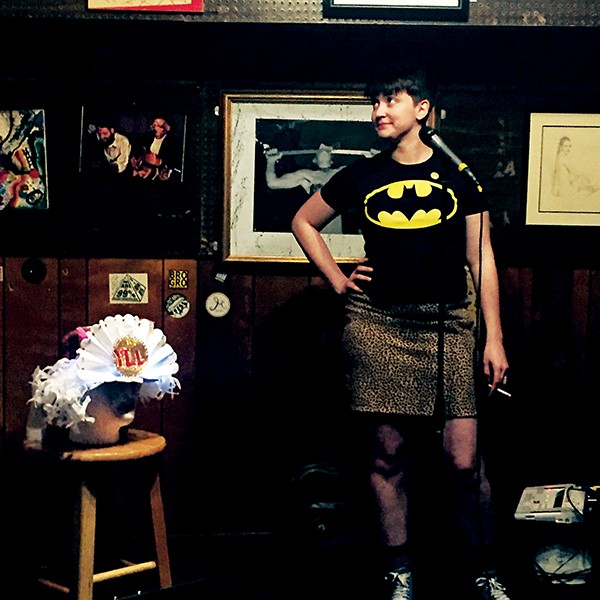 Photographs by Chris Davis
Photographs by Chris Davis
Katrina Coleman, founder of the Memphis Comedy Festival, brings the funny.
Had things turned out the way she originally planned, Katrina Coleman, might not have founded the Memphis Comedy Festival. There was a time when she wanted to be a road dog and was planning go on tour with Alexander. That’s when she found out she was pregnant. “When a male comic hits rock bottom, he goes to rehab,” Coleman grumbles, setting up the deeper cut. “Females get pregnant.”
Sometimes you can’t get out of Memphis. Small children and life on the road didn’t compute. So Coleman started looking for ways to make comedy happen closer to home. In 2011 she founded the Memphis Roast Club, creating “a brotherhood of Memphis comics and comedy writers” dedicated to skewering the elite, tarnishing celebrity halos, and taking pretentious people down a peg or two.
“It created a situation where a lot of people who’d never really worked together before had to work together, and research together, and write together. I was a cruel taskmaster,” she says.
The Memphis Comedy Festival was founded a year later, when Coleman’s friend Larry Clark booked time at TheatreWorks to perform an original one-man show. Clark, a contemporary vaudevillian who’s juggled chainsaws on tour with Nine Inch Nails, driven nails up his nose for Jim Rose’s Sideshow, performed host clown duties for Ringling Bros. and Barnum & Bailey Circus, and sacked groceries at the Kroger at Poplar and Cleveland, didn’t think his new show would be ready in time. So Coleman agreed to take over the dates to produce something comedy-related. And festive.
“We had a Dollar Store table cloth with stick-on letters that read ‘Memphis Comedy festival,'” Coleman says, telling her janky origin story. At the end of weekend when accounting time arrived, she realized all expenses were covered with $121 to spare. “I cried and danced around the theater,” she says, closing her eyes and clutching the imaginary money to her chest. “And before I could say ‘Well, that’s done,’ people were coming to me and asking when I was planning on doing it again next year. And so it began.”
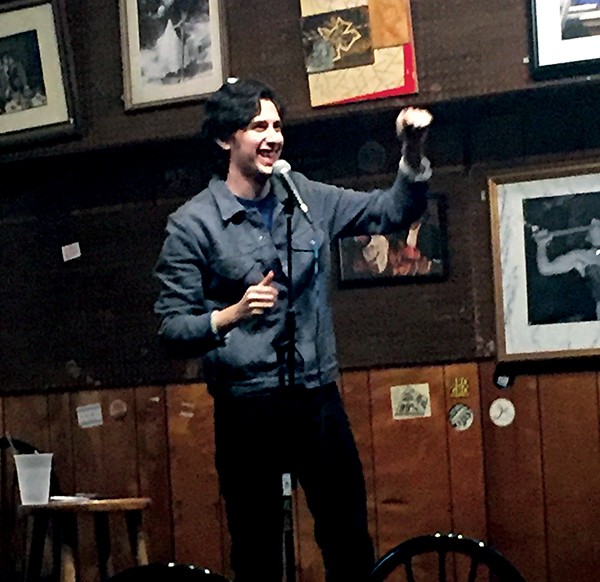
Tommy Oler talks soap and butt-munchers at the P&H Cafe.
Tommy Oler has his own ideas about what makes Memphis’ comedy special. “So this girl was totally munching on my butt,” he says. “And she was like, ‘Ugh! It tastes like soap. And I was like, ‘Uhhh, you’re welcome?'” But that’s another story entirely.
Oler, who’s developmentally stuck somewhere around the seventh grade (in a good way, if that’s possible), hosts the enormously popular and notoriously tough Thursday-night open mic at the P&H Cafe, a proving ground for locals and a regular stopover for touring comics like Chris Cubas and Jake Flores. He also cohosts the You Look Like a Comedy Show with Coleman, a monthly bloodsport where comics go head-to-head trading brutal insults, such as: “You look like you were going for ‘sexy school librarian’ but settled for the lunch lady;” “You look like you were fired from Medieval Times for being too into it;” and the devastating, “You look like Harry Potter’s sorting hat assigned you to the House of 1000 Corpses.”
Oler started performing in Knoxville at a monthly open mic where he had to pay a cover charge in addition to bringing three paying guests, who also had to buy at least two overpriced drinks so he could perform. “I’ve been a lot of places,” he says. “And this is one of the nicest scenes around.”
Oler would know. Open mic hosts are like comedy gatekeepers. Or, as Oler’s friend and Dirty Show founder Lila Bear puts it, “It isn’t like some kind of Mafia thing, but it is like some kind of Mafia thing. But you’ll always do fine as long as you aren’t mean.”
Hunter Sandlin is a bespectacled fellow who uses the Twitter account @Ireviewvans to store his vast archive of deadpan jokes about living in vans and van-related humor. He’s been performing his unique brand of van, snack, and CPAP mask-related comedy for two years and confirms that, while the local scene may appear clubby at first, it supports new comics no matter how different the work may be.
Sandlin has a gift for surreal imagery and awkward non sequitur. He experimented with stand-up in college but didn’t get serious about it until he and his wife split up in 2014. “I’m a lot older than most of the other comics,” he moans, falling into the woeful cadence of his stage persona. “I’ve found myself hanging out with 24-year-olds again. And that’s weird.”
Sandlin is adamant. If he ever lives in a van again, he’s not going to share it with a roommate, because there’s not enough room for him and all of his trophies, let alone some other guy and all of his trophies. He describes open mics as “safe places” where “nobody judges you even if you’re hopelessly terrible.” Except, of course, for hecklers.
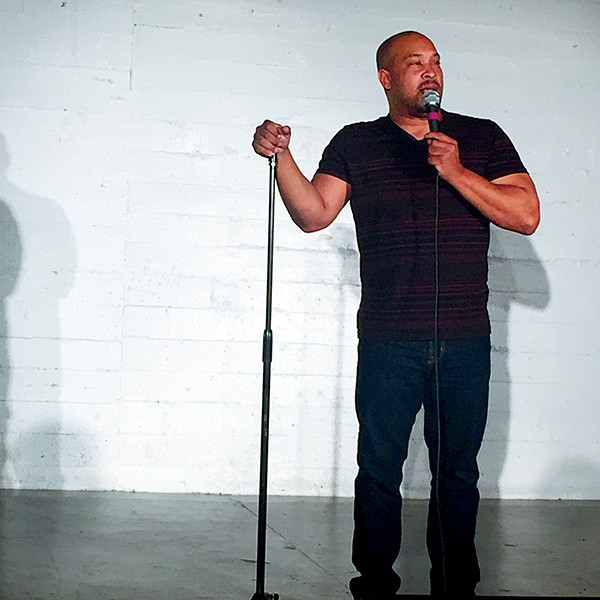
Richard Douglas Jones bounces off the couch and into comedy.
Like Sandlin, Richard Douglas Jones had some history with stand-up, but only committed to it after a difficult breakup. “I was working for the Peabody Hotel when somebody jumped off the roof, and my coworker and I were the first people to find the body.” That same day, his girlfriend, who knew he’d just found a body, came home and broke up with him. Depression set in, and productivity bottomed out. First Jones lost his job, and then he lost his will to leave his apartment or even get off the couch. Except for when he’d go out to work on his comedy at open mics around town. “Comedy literally saved my life,” he says.
Since coming off the couch, Jones has proven himself to be one of the funniest comics in Memphis. He’s opened for Hannibal Buress and warmed the crowd for Patton Oswalt, whom he now describes as an email buddy. He hosts the Black Nerd Power podcast and the Black Nerd Power Comedy Hour showcase which is held monthly in the Basement, a disconcertingly white venue in Crosstown. I’m talking about the paint job, of course.
Jones isn’t a fan of the traditional comedy club system. “For an unknown comic, it’s like begging,” he says, explaining why he feels it’s important to create opportunity for other comics. “If there’s anything I really want to accomplish, it’s to get comedy respected as an art form. When people hear somebody say ‘I’m an artist,’ they’re like, ‘Well, do you sing? Dance? Paint? Anything?’ We live in a city where poets get more respect than comics. Fucking poets.”
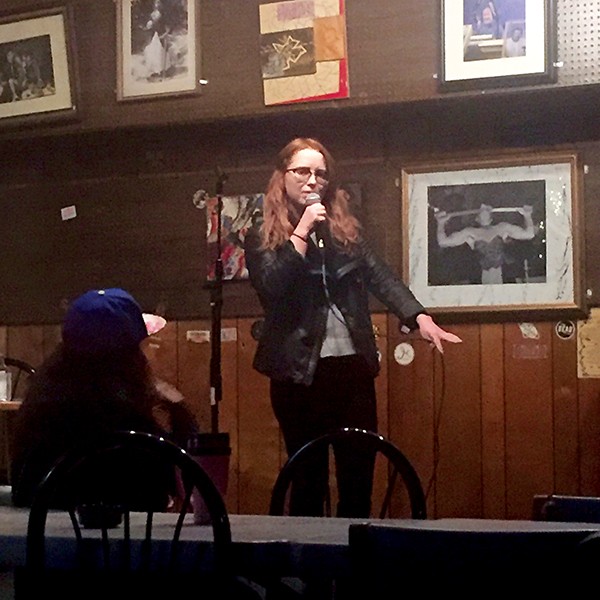
Lila Mae Bear
After hosting the Black Nerd Power podcast for two years, Jones launched the Black Nerd Power Comedy Hour showcase, “because the black experience isn’t homogeneous, and that’s not always reflected in comedy.” Comics who don’t ascribe to the Def Comedy Jam model, “aren’t always included in the reindeers’ games,” he says. “But as I went out and traveled, I realized I wasn’t as exotic a bird as I thought I was. There are a lot of comics of color in this alternative scene. But in a lot of cases, within our home scenes, we’re the only Klingon on the Starship Enterprise, if you know what I mean. So I wanted to create a space for comics of color who are genuinely funny, but don’t get much love in the urban rooms.”
Memphis’ tallest comic, Benny Elbows, named his Blacksmith Comedy company for something he heard Katrina Coleman say once, and he embodies the idea: “Memphis has a great comedy scene, but there’s no brass ring. You’ve got to make your own.” Through Blacksmith, Elbows produces shows for visiting comics, and hosts a game-based show called Homeroom. He also does stand-up all over town, and performs improv with the Wiseguys.
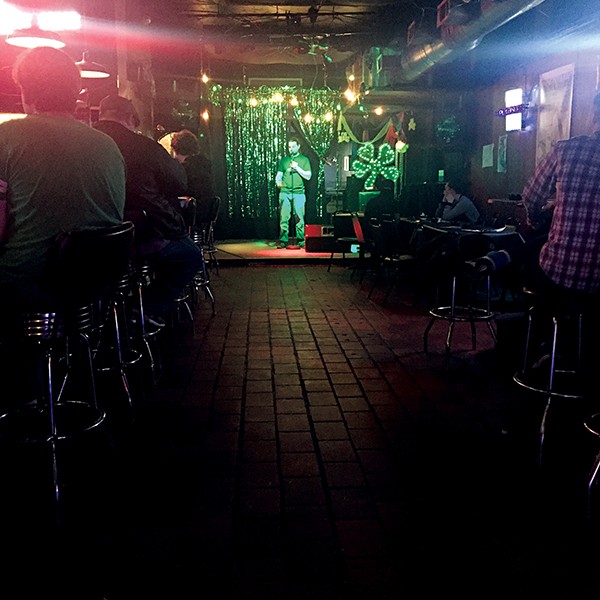
Doug Gillon, cohost of Tuesday Show Comedy, knows comedy can bring a crowd.
When Alexander was in the hospital with blood clots in his heart, Elbows dropped by every afternoon to help his fellow comic learn to walk again. There’s a reason why Joshua McLane, the hyperactive host of the Hi-Tone’s Don’t Be Afraid of show calls Elbows, “the future of Memphis comedy.” In spite of all that, he still can’t quite believe how much the independent comedy scene has grown over the past five years. “Part of me worries that it’s a bubble,” Elbows says, sitting on the back porch of the P&H Cafe. “And I’m afraid it’s just going to burst and I’m going to wake up tomorrow and nobody in Memphis is going to want to hear comedy again.”
And then he laughs.
Memphis Comedy Festival March 31st-April 3rd. For schedule and ticket informaton visit memphiscomedyfestival.com.
Where to Find Comedy in Memphis
Sunday – Open Mic, 7 p.m.
The Cove
Monday – Open Mic, 9 p.m. Dru’s Place
(2nd and 4th Mondays of the month) – LOL Memphis Sketch & Improv Show, 7 p.m., Chuckles Comedy House
Tuesday – Showcase, 8 p.m.
Mot & Ed’s Soulspeak
Tuesday – Open Mic, 8 p.m.
Chuckles
Wednesday – Showcase,
8:30 p.m., Clicks
Wednesday – Open Mic, 8 p.m., RockHouse Live
Thursday – Open Mic, 9:30 p.m., P&H Cafe
Friday – Showcase, 9 p.m., BeRatus Restaurant and Grill
Friday – Showcase, 10 p.m., Pulse Lounge
Saturday – (2nd Saturday of the month) Wiseguys Improv Show, 8 p.m., Cafe Eclectic
Saturday – (3rd Saturday of the month) Wiseguys Improv Show, 10:30 p.m., Cafe Eclectic
Recurring Showcases
Don’t Be Afraid of the Comedy, Memphis
The Tuesday Show
The Best Damn Nerd Show
You Look Like a Comedy Show
Black Nerd Power Comedy Hour
Leftist Comedy Night
Comedy Clubs
Chuckles Comedy House
Podcasts
Black Nerd Power
You Look Like a Comedy Show
Rocket Science Audio
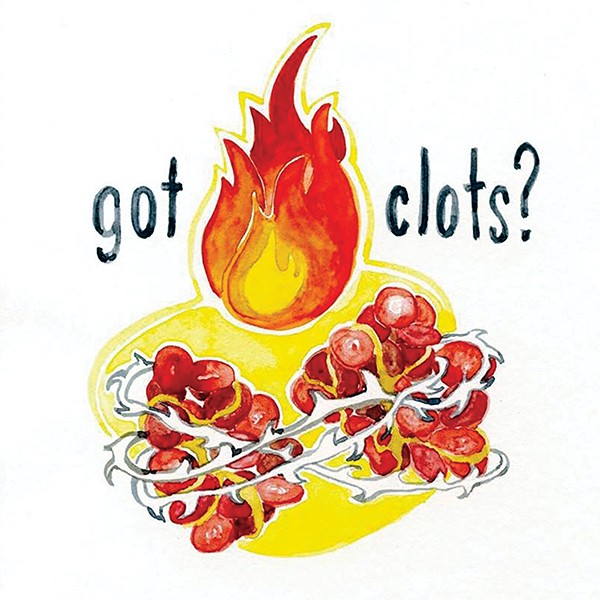
Resurrection Man
Memphis Comic Mo Alexander releases his new CD, “Got Clots.”
On April 5, 2015, Memphis comedian Mo Alexander died. And for the first time in his life, it had absolutely nothing to do with his material. The “slap the stupid” funnyman had a pair of blood clots in his heart, and although he was quickly resuscitated, the prognosis wasn’t good. He’d pee on a nurse and die at least one more time before things started getting better.
“You know, when I came to, I had this mark on the back of my head, and nobody’s owned that one yet,” he says, airing his grievances, but happy to be alive again and working.
Memphis Flyer: So the name of your new CD is “Got Clots.”
Alexander: It’s the most personal album I’ve ever done. It’s about me dropping dead twice in the hospital. Dealing with crazy nurses. Then having to learn how to walk again. Everything that happened to me during the 78 days in the hospital. I talk about the highlights.
But, are blood clots funny?
Blood clots are hilarious, trust me. Now, none of it’s funny when you can’t breathe, but once you can breathe again, it all is. I’m releasing the record on April 5th, which is the year anniversary of me dropping dead the first time. I think that’s funny. I rolled over to get a urinal. Next thing I know, I’m on a ventilator. Some people ask if I saw a light or anything, and I didn’t. But I swear I heard Notorious B.I.G. singing, “I love it when you call me Big Poppa.”
Of course, you did.
You know, Memphis comedy really supported me when I was in the hospital, and I’ve got to give them a lot of love for that. Parties with beer and everything. $20 in a sock. That’s why I don’t hate them all nearly as much as I used to.”

 Facebook/The P&H Cafe
Facebook/The P&H Cafe 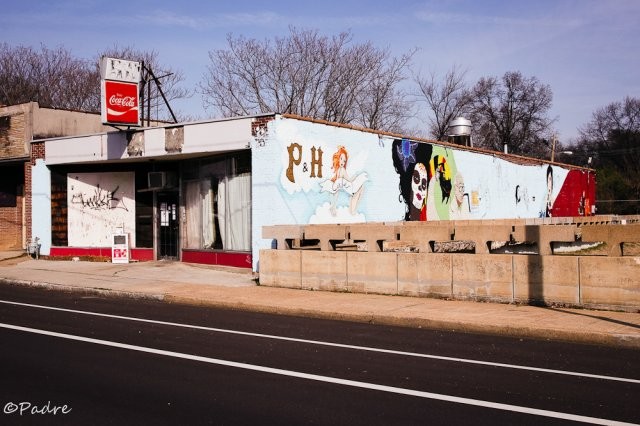 P&H
P&H 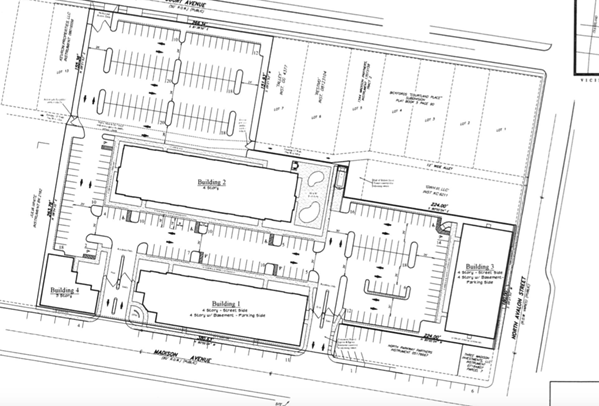

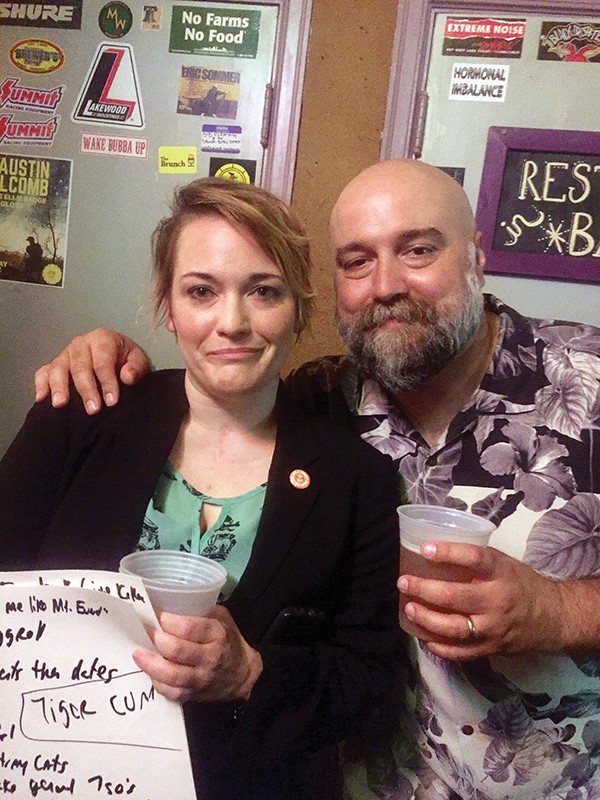
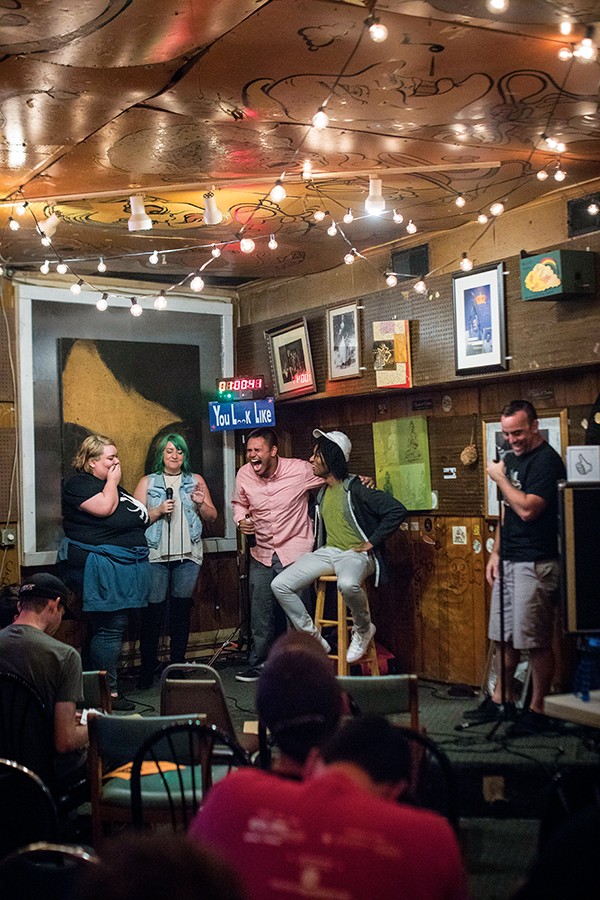
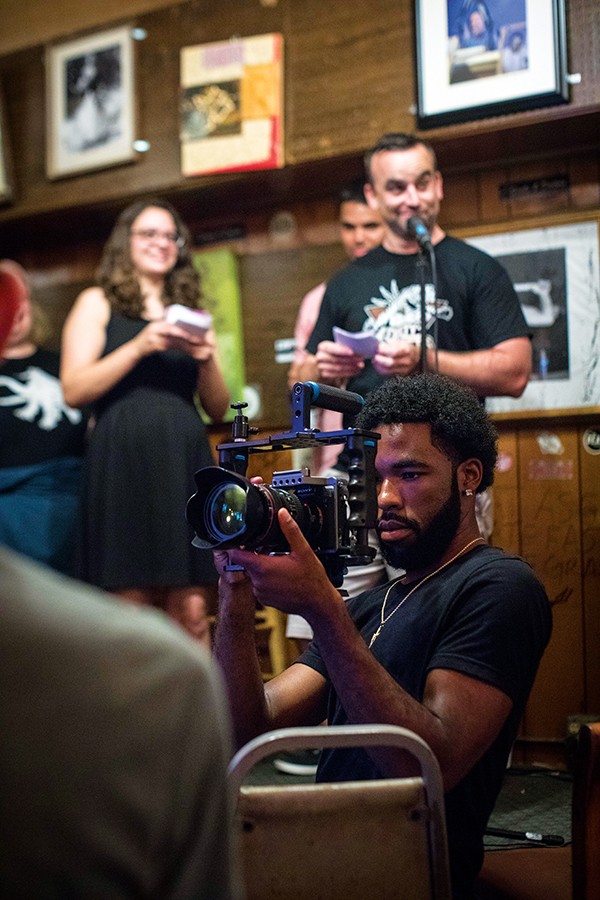
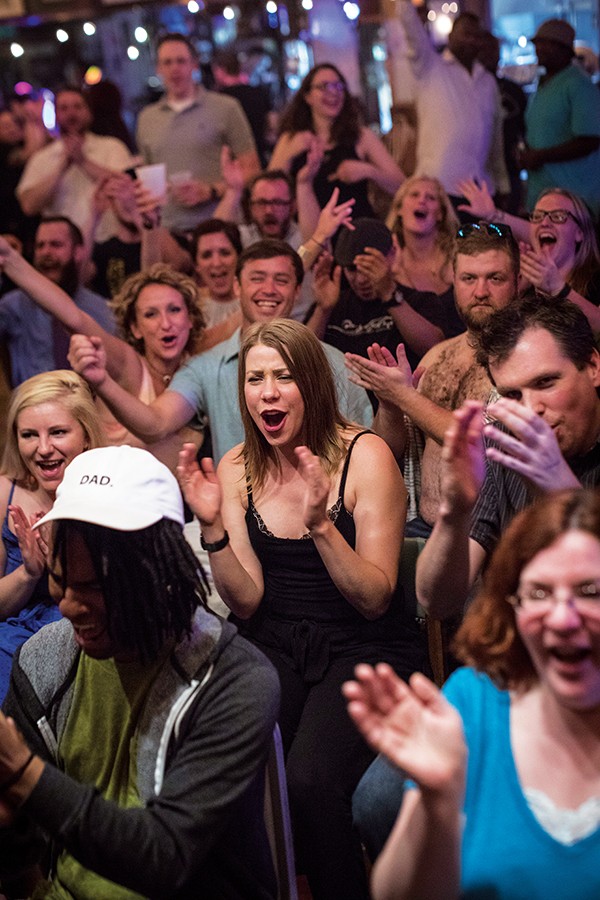
 Photographs by Chris Davis
Photographs by Chris Davis 




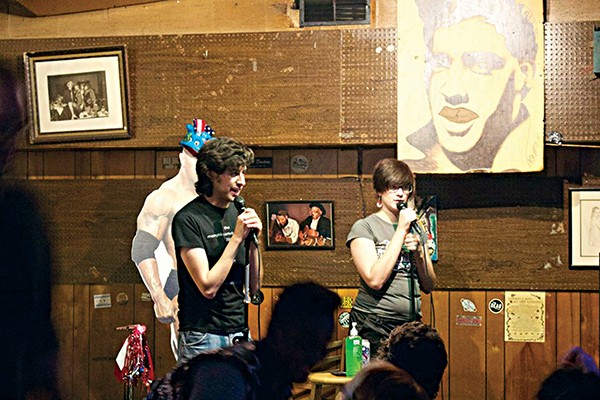 Courtesy Tommy Oler
Courtesy Tommy Oler 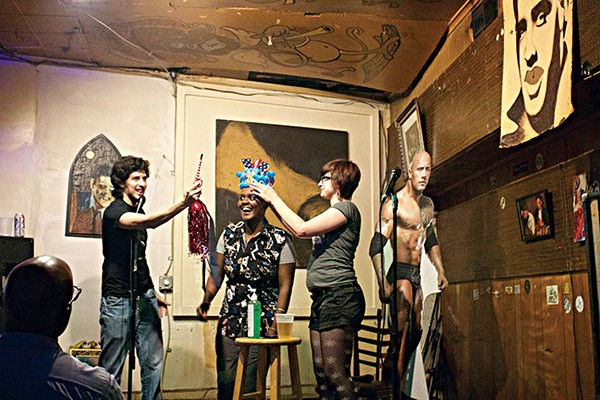 Courtesy Tommy Oler
Courtesy Tommy Oler 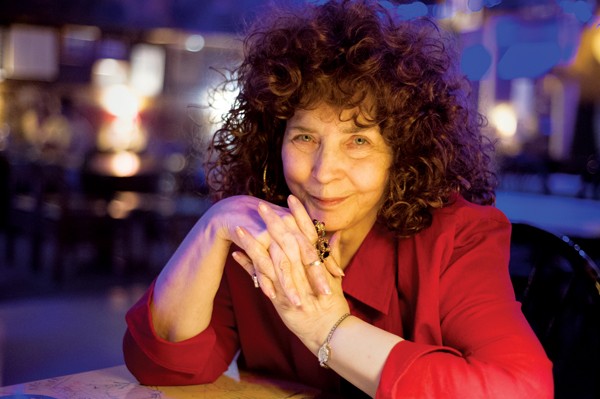 Brandon Dill
Brandon Dill 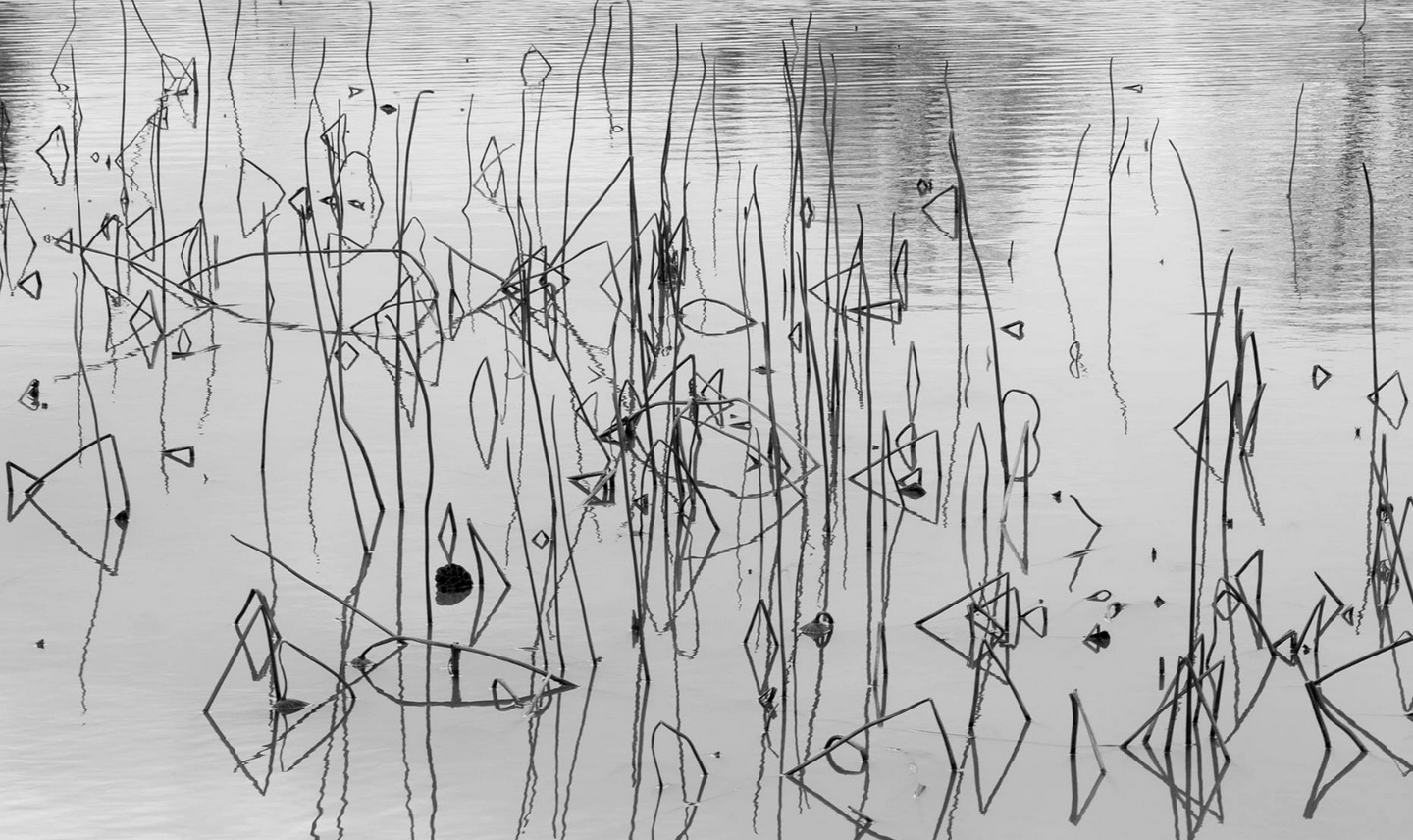 Photo by Fontaine Pearson
Photo by Fontaine Pearson 